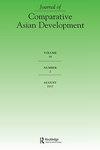Innovation Resistance of Political Websites and Blogs among Internet Users in Singapore
Q3 Social Sciences
引用次数: 5
Abstract
Abstract The Internet has become an influential platform to disseminate diverse political perspectives and promote democracy. With the prevalent use of the Internet, Singapore is a unique context to examine if its people resist online political information in a socio-political situation where politics is considered a sensitive domain and content regulation is imposed on mainstream media. The study integrates the concept of innovation resistance and the ideas derived from the Technology Acceptance Model to explore the reasons why Singaporeans resist political websites and blogs. After a focus group discussion, a web survey by Nielsen of 607 respondents using a sampling frame to ensure representativeness of Singapore's Internet users found that more than 40 per cent had never visited even one political website or blog. The data analysis reveals five main factors that cause the innovation resistance: perceived usefulness/image barrier, realization, perceived ease of use, peer influence and habitual conflict. Apart from perceived ease of use, the rest are found to affect users’ intentions regarding future adoption.新加坡网民对政治网站与博客创新的抗拒
互联网已成为传播多元政治观点、促进民主的重要平台。随着互联网的普遍使用,新加坡是一个独特的环境,在政治被视为敏感领域和主流媒体内容监管的社会政治环境中,人们是否抵制在线政治信息。本研究结合创新抗拒的概念和科技接受模型的观点,探讨新加坡人抗拒政治网站和博客的原因。在一次焦点小组讨论之后,尼尔森(Nielsen)对607名受访者进行了一项网络调查,调查采用抽样框架,以确保新加坡互联网用户的代表性。调查发现,超过40%的受访者从未访问过任何一个政治网站或博客。数据分析揭示了造成创新阻力的五个主要因素:感知有用性/形象障碍、实现、感知易用性、同伴影响和习惯性冲突。除了感知到的易用性外,其他因素也会影响用户对未来采用的意图。
本文章由计算机程序翻译,如有差异,请以英文原文为准。
求助全文
约1分钟内获得全文
求助全文
来源期刊

Journal of Comparative Asian Development
Social Sciences-Political Science and International Relations
CiteScore
1.30
自引率
0.00%
发文量
2
期刊介绍:
The Journal of Comparative Asian Development (JCAD) aims to offer the most up-to-date research, analyses, and findings on the many aspects of social, economic, and political development in contemporary Asia conducted by scholars and experts from Asia and around the world.
 求助内容:
求助内容: 应助结果提醒方式:
应助结果提醒方式:


